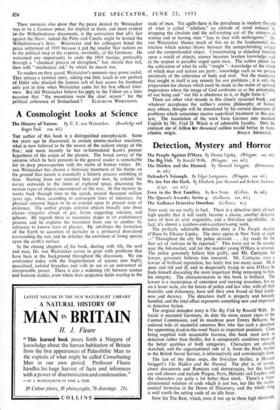A Cosmologist Looks at Science THE author of this book
is a distinguished astrophysicist. Some ten years ago he discovered, in certain atomic-nuclear reactions, what is now believed to be the source of the radiant energy of the Sun ; and more recently he has re-formulated Kant's pioneer hypothesis of the origin of the planets. The broad survey of the universe which he here presents to the general reader is remarkable for its deep preoccupation with the realm of human values. Dr. von Weizsacker has chosen a historical treatment of his theme on the ground that nature is essentially a historic process unfolding in time. Starting from our situation here and now, he extends his survey outwards to the limits of explored space, discussing the various types of objects encountered on the way. In like manner he works back through time to the epoch, several thousand million years ago, when, according to convergent lines of inference, the physical universe began to be or entered upon its present state of existence. The author groups celestial objects broadly into three classes—irregular clouds of gas, forms suggesting rotation, and spheres. He regards these as successive stages in an evolutionary process, and he explains the transition from one to another by reference to known laws of physics. He attributes the formation of the Earth to accretion of particles in a primaeval dust-cloud surrounding the sun, and he sketches the evolution of living species upon the earth's surface.
In the closing chapters of; his book, dealing with life, the soul and man, Dr. von Weizsacker comes to grips with problems that have been in the background throughout the discussion. We are confronted today with the fragmentation of science into highly specialised, isolated branches, and with its use as an instrument of irresponsible power. There is also a widening rift between science and humane studies, even where their respective fields overlap in the study of man. Yet again there is the prevalence in modern thought of what is called " nihilism," an attitude of mind induced by dropping the absolute and the self-existing out of the universe of science and so leaving man " face to face with nothingness." Dr. von Weizsacker blames much of this on to the fundamental dis- tinction which science 'draws between the comprehending subject and the comprehended object. Concentrating in detached freedom upon a world of objects, science becomes loveless knowledge such as the serpent in paradise urged upon man. The author pleads for the cultivation of what he calls " insight "—knowledge of the whole of which man and nature are parts ; knowledge such as we possess intuitively of the coherence of body and soul. Not (he maintains) that insight in itself is any remedy for our problems ; it is only the preparation for choices which must be made in the realm of spiritual imperatives where the image of God confronts us as the potentiality of our being and " our life is obedience to it, or flight from it." There are other vital strands in this closely reasoned book ; and whatever acceptance the author's cosmic philosophy of history may obtain, thought will be stimulated by his earnest discussion of problems which sometimes receive superficial treatment in this con- text. _ The translation of the work from German into standard English by Mr. Fred D. Wieck is of admirable lucidity. Only the constant use of billion for thousand million would betray its trans-


















































 Previous page
Previous page